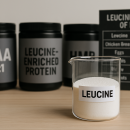The development of nutritional supplements may often be seen as a purely scientific pursuit: choosing the right ingredients, optimising doses, getting the taste right, ensuring bioavailability, while meeting cost targets.
However, in reality, it is inseparable from the supply chain. Science alone isn’t enough.
This is especially true for me. Unlike most formulators, my job doesn’t end with a product recipe.
It is also my responsibility to ensure that every ingredient I choose to use in my products is reliably sourced, consistent, meets all quality and regulatory criteria, and comes at the right cost. Every decision I make in the lab must align with sourcing realities, storage limitations, regulatory frameworks, risk management, and supplier relations.
Science alone can’t deliver a product. Logistics, supply management, and practical execution are just as critical to turning a formula into a real, effective supplement.
The modern formulator must integrate these abilities. They have to be systems thinkers, part scientist, part supply-chain strategist, part operator, turning sound concepts into dependable, scalable products that work in the real world. Integration is not a nice-to-have; it is a must have competency of contemporary formulation. And often, that’s the harder half, especially if you don’t outsource to private-label manufacturers.
1. Ingredient Sourcing: Quality Starts Here
Even the most innovative formula can fail if the supply or quality of its raw materials is inconsistent. A formulator must think like a supply chain strategist:
-
Purity and consistency: Variations in protein isolates, plant extracts, or minerals can change efficacy and stability. It is important to vet ingredients properly.
-
Certifications: Organic, GMP, allergen-free, and third-party testing ensure quality and safety. Some retailers are very strict about this and my products have consistently passed all these stringent checks with retailers like Faithful to Nature.
-
Lead times: Knowing how long it takes to receive each ingredient is essential for planning production. In South Africa, especially for natural ingredients, this hasn’t always been an easy task.

Just like a chef handpicks fresh vegetables, I often visit my suppliers’ warehouses to see ingredients firsthand. Because great formulations start with what goes into them. Image by aleksandarlittlewolf on Freepik
2. Storage and Stability
Some nutrients are fragile. Vitamins degrade, polyphenols oxidise, and proteins can clump or denature. Flavours can lose potency. Supply chain decisions affect:
-
Storage conditions: Temperature, humidity, and light exposure can make or break ingredient potency.
-
Inventory rotation: FIFO (First In, First Out) ensures older ingredients don’t lose bioactivity before they’re used.
-
Packaging: Choosing appropriate barriers and containers to maintain shelf life.
3. Regulatory and Compliance Considerations
A supplement formula is also a regulatory product. Supply chain knowledge ensures that:
-
Ingredients are legally permitted in target markets.
-
Certificates of analysis (CoAs) are available and traceable.
-
Any potential allergens or contaminants are accounted for and declared.
4. Risk Management: Contingency Planning
Ingredient shortages, shipping delays, and quality failures are realities in the supplement industry. A formulator who understands the supply chain can:
-
Identify alternative suppliers without compromising efficacy. For example, I mitigated cocoa supply chain issues by proactively sourcing alternatives, testing them in all formulas, and coordinating closely with suppliers.
-
Adjust formulations based on ingredient availability. Likewise, for my recipes based on milk powder, I have already vetted and tested a dozen other sources ahead of time.
-
Maintain production schedules and client expectations.
Formulator takeaway: Innovation isn’t just about new ingredients; it’s about designing formulas resilient to supply disruptions.

Cocoa supply isn’t guaranteed. Climate, logistics, and market shifts can all disrupt availability. That’s why I proactively source and test alternatives to keep formulations resilient. Source: https://patch.com/california/across-ca/african-cocoa-bean-shortage-impacts-chocolate-production
5. Communication and Collaboration
A good formulator isn’t isolated in the lab. They communicate with procurement, quality control, and manufacturing teams. Understanding supply chain dynamics allows for:
-
Better negotiation with suppliers.
-
Optimised ingredient combinations that balance cost, availability, and functional synergy.
-
Faster problem-solving when delays or quality issues arise.
In my case, the job is “simpler” because I assume all of these roles. I can make real-time decisions across formulation, sourcing, manufacturing, and quality control, ensuring smoother processes and fewer bottlenecks.
Conclusion
For the modern supplement formulator, science and supply chain knowledge are inseparable. Knowing the biochemistry of your ingredients is critical, but knowing where they come from, how to get them to the manufacturing facility, and how they reach the final product is equally essential.
Anyone working with me knows they are getting the output of several specialties in one person, formulation, sourcing, manufacturing, quality control, and more, ensuring a truly integrated approach from concept to consumer.
To view my Professional Profile on LinkedIn:please click here
To see my latest product creations: www.bioteenhealth.com
To view my Scientific Publications on PubMed:please click here
To get in touch, please write to: info@supplementscientist.com
Follow supplementscientist.com on Facebook: please click here
Disclaimers
Medical: The information presented on this website is intended for adults 18 or over. Its aim is purely educational and does not constitute medical advice. Please consult a medical or health professional before you begin any program related to exercise, nutrition, or supplementation especially if you have a medical condition. If you consume any product mentioned on our site, you do so on your own free will, and you knowingly and voluntarily accept the risks.
Other: The views expressed in this blog article are solely mine and do not represent the opinions or positions of any company or institution with which I am associated. Any information or opinions provided are based on my personal experiences, research, and understanding. I strive to ensure accuracy and reliability of the information provided.
© 2025. Supplementscientist.com







Leave a Reply